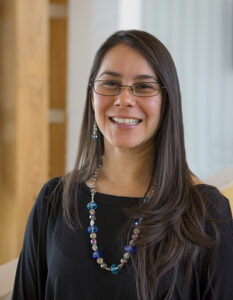Training the Next Generation of Conservation Leaders

De Urioste-Stone
An interdisciplinary team of UMaine researchers led by Mitchell Center Faculty Fellow Sandra De Urioste-Stone was recently awarded a five-year, $2.99 million grant to help graduate students develop the innovative mix of skills they’ll need to succeed as conservation leaders. The award comes from the National Science Foundation’s prestigious Research Traineeship Program (NRT), where fewer than one in six proposals are typically funded.
Unlike many conservation training programs whose primary emphasis is on species and ecosystems, the new grant – Enhancing Conservation Science and Practice – is equally focused on people and nature. Thus, the project’s graduates will be as adept at helping rural communities – where lives and livelihoods are closely tied to the surrounding land- and sea-scape – as they are at addressing biodiversity challenges per se.
Given the multi-faceted nature of many conservation issues, the project’s leadership team includes faculty with expertise in economics, forestry, communication, conservation biology, community psychology, ecosystem modeling, tourism, governance, public policy, and several other fields. Seven of the project’s nine faculty are members of the Mitchell Center.
One of the project’s central goals is to train graduate students to work outside academia. A recent National Academy of Sciences report found that many graduate students seeking careers outside higher education don’t have the skills to succeed.
“Most graduate students are trained to become professors rather than to work in non-governmental organizations, the private sector or government,” says De Urioste-Stone.
Thus, one of the key components of the project is to determine how to integrate, within existing curricula, elements that allow trainees exposure to other skills that are helpful beyond academia. In preparation for the arrival of the first cohort of students, the team met on a regular basis to craft a ‘Specialization in Conservation Science’ training program made up of new and existing courses. The first new course launched in fall 2019 and focused on the concept of resilience. Conservation partners involved in the course help students learn about existing conservation efforts and research needs and identify potential internships – a critical facet of the program. A second new course focused on collaboration and facilitation techniques will be offered as a one-week intensive in January 2020.
Bridie McGreavy notes, “The NRT comes at the perfect moment to expand our efforts to make research relevant for sustainability challenges and continue to strengthen the relationships many of us already have with conservation partners”.
The leadership team is comprised of Aram Calhoun, Wetland Ecology; Adam Daigneault, Forest, Conservation & Recreation Policy; Daniel Hayes, Remote Sensing & Geospatial Analysis; Bridie McGreavy, Environmental Communication; Sarah Nelson, Watershed Biogeochemistry; Laura Rickard, Risk Communication; Linda Silka, Community-University Partnerships; and Aaron Weiskittel, Biometrics and Modeling. Sabrina Morano is the NRT Program Coordinator.
For more on the NRT program: umaine.edu/conservationscience/
